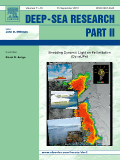
DEEP-SEA RESEARCH PART II-TOPICAL STUDIES IN OCEANOGRAPHY
Scope & Guideline
Exploring the Depths of Oceanic Knowledge
Introduction
Aims and Scopes
- Marine Ecosystem Dynamics:
Research on the structure, diversity, and functioning of marine ecosystems, particularly in deep-sea environments, focusing on interactions among species and their responses to environmental changes. - Oceanographic Processes:
Studies examining physical and chemical ocean processes, including currents, mixing, and nutrient dynamics, and their influence on marine life and biogeochemical cycles. - Climate Change Impacts:
Investigations into the effects of climate change on marine ecosystems, including shifts in species distributions, changes in nutrient availability, and alterations in ocean chemistry. - Biodiversity and Conservation:
Research addressing the biodiversity of marine species, including assessments of habitats, species interactions, and conservation strategies in the face of anthropogenic pressures. - Technological Advancements in Marine Research:
Development and application of advanced technologies for ocean exploration and monitoring, including satellite observations, autonomous underwater vehicles, and data assimilation techniques.
Trending and Emerging
- Microplastics and Pollution Studies:
There is a rising trend in research addressing the distribution and impact of microplastics and other pollutants on marine ecosystems, reflecting growing global concern about marine pollution. - Climate Change and Marine Ecosystem Resilience:
Research focusing on the resilience of marine ecosystems to climate change is increasingly prevalent, emphasizing adaptations and shifts in species distributions and community structures. - Technological Innovations in Oceanography:
Emerging studies utilizing advanced technologies such as machine learning, autonomous underwater vehicles, and satellite data are gaining prominence, indicating a shift towards more data-driven and innovative approaches to ocean research. - Biogeochemical Cycling in Changing Oceans:
Research investigating biogeochemical processes, particularly in relation to changing ocean conditions and their implications for carbon cycling and nutrient dynamics, is becoming increasingly significant. - Integrated Ecosystem Approaches:
There is a growing emphasis on integrated research frameworks that combine ecological, physical, and socio-economic aspects to address complex marine issues, reflecting a holistic approach to oceanography.
Declining or Waning
- Historical Climate Reconstructions:
While historical climate studies were once a core focus, recent publications indicate a shift towards contemporary and predictive modeling, reducing the emphasis on past climate reconstructions and their impacts on oceanic systems. - Traditional Fisheries Studies:
Research centered on conventional fisheries management and stock assessments appears to be declining, possibly overshadowed by studies emphasizing ecosystem approaches and climate resilience. - Microbial Ecology in Stable Environments:
The previously consistent focus on microbial communities in stable marine environments has waned, giving way to more dynamic studies that assess microbial responses to fluctuating conditions and disturbances. - Geological Oceanography:
Studies focused on geological aspects of the ocean floor and sediment transport have seen a decrease, as the journal increasingly prioritizes biological and ecological research in marine environments.
Similar Journals
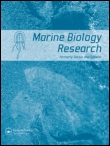
Marine Biology Research
Navigating the intersection of ecology and oceanography.Marine Biology Research is a premier journal published by Taylor & Francis, focusing on the dynamic field of marine biology and its intersecting realms of aquatic science, ecology, and oceanography. Since its inception in 2005, this journal has served as a crucial platform for researchers and professionals to disseminate their findings, with a vision extending to 2024 and beyond. The journal is recognized with a Q3 quartile ranking in both Aquatic Science and Ecology, Evolution, Behavior and Systematics, underscoring its growing influence in these fields as evidenced by its Scopus rankings. Located in the United Kingdom, Marine Biology Research aims to foster collaboration and innovation through open access options, facilitating knowledge exchange among the academic community. With a steady commitment to advancing marine sciences, this journal is an invaluable resource for those dedicated to understanding and preserving our ocean ecosystems.

MARINE ORNITHOLOGY
Fostering Insights into the Lives of Ocean-Dwelling BirdsMarine Ornithology, published by the Pacific Seabird Group, is a vital resource in the field of animal science, zoology, and oceanography. With an ISSN of 1018-3337 and E-ISSN of 2074-1235, this journal has been a cornerstone for researchers and enthusiasts since its inception, actively contributing to the understanding of marine bird species and their ecosystems. Although it is currently not an open-access journal, it provides critical insights and findings that inform both academic research and practical conservation efforts. With its category quartiles positioned in Q3 for both Animal Science and Zoology, and Oceanography, Marine Ornithology occupies a significant, albeit competitive niche among scholarly publications. Researchers can benefit from its comprehensive coverage of marine avian studies, which is crucial for addressing the challenges these species face in changing oceanic environments. As the journal continues to evolve, with coverage from 1990 to 2024, it maintains an essential role in enriching our knowledge of marine biodiversity.
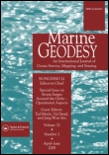
MARINE GEODESY
Unveiling the Complexities of Oceanic GeodesyMARINE GEODESY, an esteemed journal published by Taylor & Francis Inc, delves into the intricate field of oceanography, aiming to contribute profoundly to the understanding of marine spatial dynamics and geophysical processes. With an ISSN of 0149-0419 and an E-ISSN of 1521-060X, this journal has a commendable standing, currently classified in the 2023 Q2 quartile, reflecting its influential presence in the realm of Earth and Planetary Sciences, particularly oceanography, where it ranks 49th out of 145 journals. Since its inception in 1977 and its ongoing publication until 2024, MARINE GEODESY has been dedicated to disseminating groundbreaking research, case studies, and reviews that are crucial for scholars, professionals, and students engaged in the exploration of marine environments. While currently not an open-access journal, it nevertheless offers vital insights into marine geospatial analytics and geodesy, augmenting the knowledge base necessary for tackling contemporary challenges in marine science and geography.

REVISTA DE BIOLOGIA MARINA Y OCEANOGRAFIA
Advancing Understanding of Oceanic EcosystemsREVISTA DE BIOLOGIA MARINA Y OCEANOGRAFIA is a prominent academic journal dedicated to the fields of marine biology and oceanography, published by the Faculty of Marine Sciences and Natural Resources at Universidad de Valparaíso, Chile. Since its inception in 1996, this journal has been a vital platform for disseminating research findings and advancements in aquatic sciences, covering a breadth of topics relevant to the marine environment. With its current impact positioned within the Q4 quartile of both Aquatic Science and Oceanography categories in 2023, the journal serves as an essential resource for scholars, practitioners, and students alike, aiming to enhance their understanding of marine ecosystems. While the journal does not provide open access options, it continues to contribute valuable insights, helping to foster a deeper appreciation for oceanographic science and marine biodiversity. Located in the scenic city of Viña del Mar, Chile, this publication invites manuscripts that push the boundaries of knowledge and stimulate discourse within the marine sciences community, thereby promoting sustainable management and conservation of oceanic resources.

TELLUS SERIES A-DYNAMIC METEOROLOGY AND OCEANOGRAPHY
Unveiling the Secrets of Our Climate and OceansTELLUS SERIES A-DYNAMIC METEOROLOGY AND OCEANOGRAPHY, published by Stockholm University Press, is a prestigious open-access journal that has been at the forefront of research in the fields of atmospheric science and oceanography since its inception in 1983. With an enduring commitment to disseminating high-quality, peer-reviewed research, the journal has achieved a commendable impact factor, securing its position in the Q2 category for both Atmospheric Science and Oceanography as of 2023. The journal's significant reach is reflected in its Scopus rankings, being positioned at Rank #51 in Oceanography and Rank #77 in Atmospheric Science. With open access established since 2012, TELLUS SERIES A serves not only as a vital resource for researchers and professionals in these dynamic fields but also as an inclusive platform for budding scholars and students. Engaging with this journal allows readers to stay updated on the latest developments and groundbreaking discoveries that advance our understanding of climate systems and marine environments. Its editorial ethos emphasizes the cross-disciplinary integration of atmospheric and oceanographic studies, making it an essential publication for anyone invested in environmental research and policy.

Marine Biodiversity
Unveiling the Wonders of Oceanic DiversityMarine Biodiversity, published by SPRINGER HEIDELBERG, stands as a pivotal journal in the fields of Aquatic Science, Ecology, Evolution, Behavior and Systematics, and Oceanography. Established in 2009, it has gained a prominent place in academic discourse, evidenced by its Q2 ranking across multiple categories in the latest 2023 assessments. The journal operates out of Germany, specifically from its Heidelberg address, and caters to an international audience with a keen interest in the vast and complex dynamics of marine ecosystems. With an ongoing convergence of research outputs until 2024, Marine Biodiversity encourages contributions that expand our comprehension of marine life and its conservation, positioning itself as a vital resource for researchers, professionals, and students alike. Although currently not an open access journal, it maintains a robust reputation backed by its favorable Scopus ranks, which indicate its significant contribution to the respective fields. By disseminating high-quality, peer-reviewed articles, Marine Biodiversity plays an essential role in promoting scholarly communication and advancement in marine science.
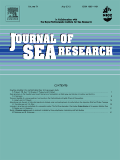
JOURNAL OF SEA RESEARCH
Empowering Researchers to Shape Marine UnderstandingJOURNAL OF SEA RESEARCH, published by Elsevier, is a premier academic journal dedicated to advancing knowledge in the fields of aquatic science, ecology, and oceanography. Since its inception in 1996, this journal has provided a vital platform for researchers and professionals to disseminate groundbreaking findings and promote fostering interdisciplinary discussions. With its impressive Q2 ranking in multiple categories, including Aquatic Science and Ecology, Evolution, Behavior and Systematics, it positions itself as a significant contributor to marine and environmental studies. The journal is accessible in both print (ISSN: 1385-1101) and online formats (E-ISSN: 1873-1414), ensuring wide reach and engagement within the scholarly community. Researchers and students alike will find the journal not only a reliable source of information but also a source of inspiration for future explorations. With a commitment to quality and a broad scope that spans fundamental to applied research, JOURNAL OF SEA RESEARCH remains an indispensable resource for understanding the complexities of marine environments and their relevance to our changing world.

JOURNAL OF OCEANOGRAPHY
Unveiling the Secrets Beneath the WavesJOURNAL OF OCEANOGRAPHY, published by Springer, stands as a leading academic journal in the field, with an impressive Q1 ranking in Oceanography for 2023. Since its inception in 1992, this journal has dedicated itself to the dissemination of high-quality research that spans a diverse array of topics within oceanography and earth sciences. With an ISSN of 0916-8370 and an E-ISSN of 1573-868X, it plays a crucial role in bridging the gap between academia and practical marine applications. The journal is indexed in Scopus, ranking #57 out of 145 in its category, reflecting its rigorous academic standards and the impact of its published works, reaching a notable ile in the 61st percentile. Located in Japan, the JOURNAL OF OCEANOGRAPHY provides a vital platform for sharing significant research findings that contribute to our understanding of marine environments, aiming to foster interdisciplinary collaboration among researchers, professionals, and students dedicated to marine science.
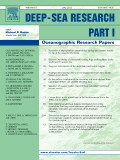
DEEP-SEA RESEARCH PART I-OCEANOGRAPHIC RESEARCH PAPERS
Illuminating the complexities of marine environments.DEEP-SEA RESEARCH PART I-OCEANOGRAPHIC RESEARCH PAPERS is a prestigious journal published by Pergamon-Elsevier Science Ltd, dedicated to advancing the field of oceanography. With an ISSN of 0967-0637 and E-ISSN of 1879-0119, this journal provides a vital platform for researchers, professionals, and students to disseminate and access high-quality, peer-reviewed papers on various aspects of oceanographic research. Recognized in the top quartiles of aquatic science and oceanography (Q1 and Q2 respectively), DEEP-SEA RESEARCH PART I boasts a significant impact factor and ranks impressively within the Scopus database, positioning itself as a leading resource in its field. Although it does not provide open access, it remains a critical repository of knowledge for those invested in understanding the complexities of marine environments. This journal plays a crucial role in enhancing our comprehension of deep-sea ecosystems, promoting innovative research, and fostering interdisciplinary collaboration.
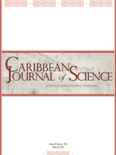
CARIBBEAN JOURNAL OF SCIENCE
Exploring the vibrant scientific landscape of the Caribbean.Caribbean Journal of Science, published by the University of Puerto Rico, serves as a crucial platform for disseminating innovative research in the field of science across the Caribbean region. With an ISSN of 0008-6452, this journal captures the essence of multidisciplinary studies, ranking 47 out of 111 in its category, showcasing a 58th percentile within Scopus. Although it doesn't currently offer Open Access, it has extended its academic reach since its inception in 1980, fostering collaboration and knowledge growth among researchers, professionals, and students alike. The journal covers an expansive range of scientific disciplines and continues to be a vital resource for those seeking to engage with and contribute to the scientific landscape of the Caribbean. For anyone dedicated to advancing scientific inquiry and practice in this vibrant region, the Caribbean Journal of Science represents an invaluable asset.